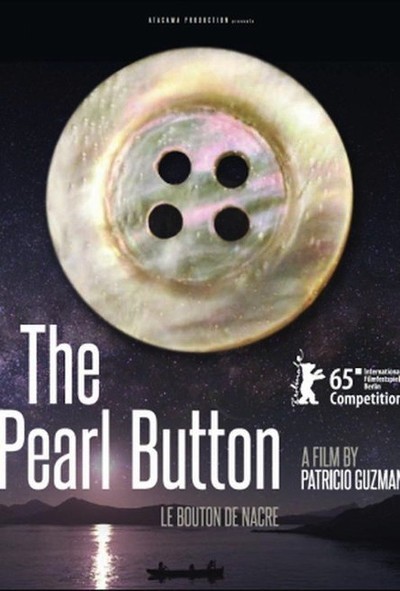 |
| The Pearl Button Movie Cover |
The Pearl Button Watch Trailer
At its beginning, Guzmán gives his film an inestimable casing that may help a few viewers to remember Terrence Malick's "Tree of Life." Watching goliath telescopes that watch the universe from a Chilean betray, the producer, who describes all through, notes that water started in the stars and came to Earth very nearly as a blessing. Presently covering a large portion of the planet's surface, the component is crucial to human life and maybe no place more obviously critical than in Chile, with its 2,600-mile coastline.
Despite the fact that bearing a portion of the relieving magnificence of a standard nature narrative, the early segments of "The Pearl Button," as they dive from the sky to the oceans, are perfectly shot and capably backing Guzman's beautiful words.
The film likewise proves some satisfying visual mind. In examining Chile's irregular topography, Guzmán demonstrates understudies unrolling a huge papier-mâché guide of the nation on a studio floor. Despite the fact that its width isn't incredible, length-wise it continues forever and on. Guzmán makes the point that it's difficult to consider Chile in general, because of its surprising shape, which is the reason individuals regularly consider it in three sections: north, focus and south.
In spite of its bounteous association with the Pacific Ocean, however, Chile has never been known as an extraordinary marine country. Its European pioneers searched inside, around the area, instead of to its watery western skyline. In doing as such, they both disregarded and ruthlessly destroyed the conventions of their indigenous forerunners, who developed a multi-faceted association with the water, particularly in the southern Patagonia area.
Guzmán's record of Chile's local individuals restores the connection between the stars and water. He utilizes old footage and photographs that show men, ladies and youngsters—who fit in with tribes that would make long ocean voyages between islands—wearing just spots of white paint that search for all the world like star maps.
Hauntingly wonderful, these pictures lead into a talk of how the European colonizers enslaved the local people groups, which was terrible in fact: "Indian-chasing" was a profitable game, in which distinctive sums were paid for different body parts. The trespassers tried to free the locals of their way of life, including their association with the ocean.
This is exemplified in a story around an indigenous teenager, which gives the film its title. A British ocean chief purchased the kid for a pearl catch, then took him to England and acquainted him with European dress and ways. Subsequent to coming back to Chile, Jemmy Button, as he got to be known, freed himself of his outside garments and hair style, yet was never, as indicated by Guzmán, ready to recapture his unique personality.
At the point when the producer takes up the subject of present day Chile's awesome political repulsiveness, the association with the ocean may strike viewers as rather invented, however there is one. Taking after the US-upheld 1973 military upset that ousted communist president Salvador Allende, a large number of the new rightist administration's rival's "vanished," i.e., were snatched, tormented and slaughtered in different courses, some of which Guzmán frightfully points of interest. As of late, it has ended up realized that numerous were flown out to ocean and dumped, alive or dead, into the sea.
It's horrible stuff, yet the genuine issue is that it appears to have a place in another film. Talking about these occasions, Guzmán's voice holds its elegiac tone while additionally becoming unpretentiously hectoring, improving focuses that would be partaken in an all the more fitting setting. Most likely numerous Chileans remain justifiably fixated on the unpleasant violations of the Pinochet administration, yet that doesn't mean they have be repeated at every conceivable artistic open door. For this situation, the subject appears to undermine—instead of expand—Guzmán's astute investigation of Chile's connection to the sea.
0 comments:
Post a Comment